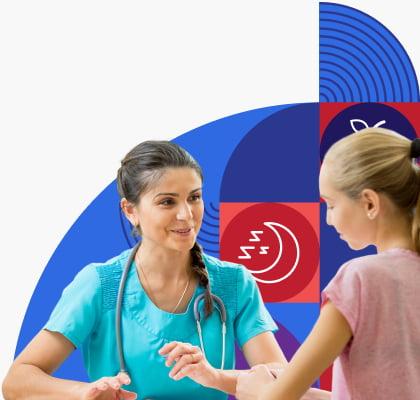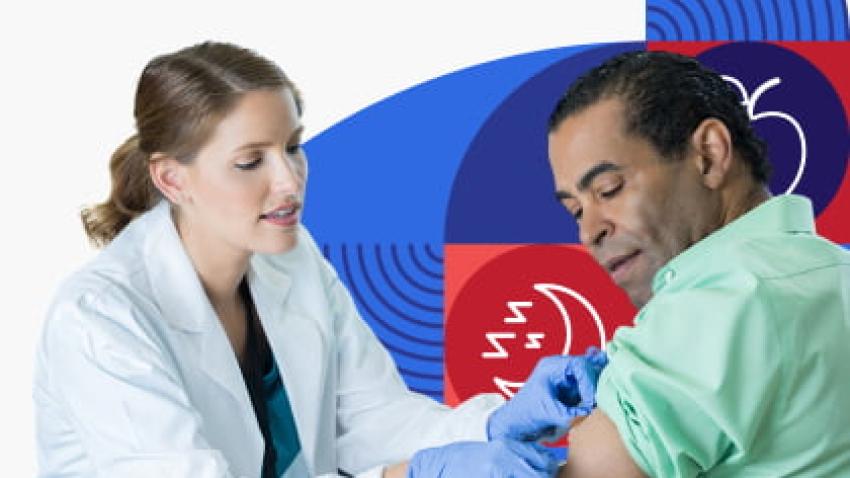Doctor Visits
Get Your Pre‑teen’s Vaccines on Schedule

The Basics
Overview
Doctors recommend that all pre-teens ages 11 and 12 years get important vaccines (also called shots or immunizations) to protect against serious diseases. Getting your child vaccinated also protects other people in your community who may not be able to get vaccines.
Which vaccines does my child need?
All pre-teens need to get the following vaccines.
Meningococcal vaccine
This vaccine protects against types of meningococcal disease, including meningitis. Meningitis is a very serious infection of the tissue around the brain and spinal cord. Kids need their first dose at age 11 or 12 years and a booster shot at age 16 years. Learn more about meningococcal vaccine.
HPV vaccine
This vaccine protects against HPV (human papillomavirus), which can cause several types of cancer. The HPV vaccine is given as a series of shots over several months, starting at age 11 or 12. Learn more about the HPV vaccine.
Tdap booster shot
This vaccine protects against tetanus, diphtheria, and whooping cough (pertussis). It's a single shot that's given to pre-teens at age 11 or 12 years. Learn more about the Tdap vaccine.
Yearly flu vaccine
Getting the flu vaccine every year is the best way to protect against the flu. Learn more about the flu vaccine.
COVID-19 vaccine
The Centers for Disease Control and Prevention (CDC) recommends that everyone age 6 months and older get vaccinated against COVID-19. Learn more about getting your child vaccinated for COVID-19.
Check out this vaccine schedule to learn more.
It’s important for your pre-teen to get all recommended vaccines.
Each vaccine protects your pre-teen from different diseases. And many vaccines require more than 1 dose. For the best protection, your pre-teen needs to get every dose of each vaccine. If they miss a dose, they may not be protected.
Why Vaccines Are Important
Why does my child need these vaccines?
Vaccines protect your child from serious — and even deadly — diseases. For example:
- Meningococcal disease can cause brain damage, hearing and vision problems, and the loss of an arm or leg — and it can even be deadly
- Tetanus can cause muscle spasms, breathing problems, paralysis (loss of muscle function), and death
- HPV can cause several types of cancer later in life
- Some serious diseases can spread easily from person to person, like the flu and whooping cough.
- As kids get older, some of the vaccines they got when they were younger begin to wear off. That’s why it’s important to get all recommended boosters. Also, pre-teens’ and teens’ risk of certain infections, like meningococcal disease and HPV infections, gets higher as they get older. Vaccinating them now makes sure they are protected later on.
It’s important for every child to get vaccines.
Thanks to vaccines, many serious childhood diseases that used to be common are now rare. But the bacteria and viruses (germs) that cause these diseases are still around.
Each person who isn't vaccinated can get sick themselves — or spread those germs to other people.
Safety and Side Effects
Are there any side effects from these vaccines?
Side effects from vaccines are usually mild and go away after a few days. The most common side effect is pain or redness where your child got their vaccine. Many people don’t have any side effects at all.
Vaccines are very safe.
Vaccines go through a careful testing process before doctors start giving them to people. Also, CDC and the Food and Drug Administration (FDA) continue to track vaccines to make sure they’re safe. The chance that a vaccine will cause a serious problem is very small.
Take Action
See a Doctor
You can protect your pre-teen’s health by making sure they get all recommended vaccines.
Schedule a checkup for your pre-teen.
The meningococcal, HPV, and Tdap vaccines can be given during your child’s yearly checkup or another doctor’s appointment at age 11 or 12 years. If your child is older but didn’t get these vaccines, it’s not too late. Make an appointment with the doctor to get them now.
Many states require that pre-teens get their meningococcal and Tdap shots before starting certain grades in school.
You can usually get COVID-19 and flu vaccines at a health clinic, pharmacy, or your local health department. If you’re not sure where to start, call your child’s doctor or your local health department.
Tell the doctor about bad reactions.
Serious side effects after getting a vaccine — like a severe allergic reaction — are very rare. If your child or another family member has ever had a bad reaction to a vaccine in the past, tell the doctor before your child gets a vaccine.
Pay extra attention to your child for a few days after they get a vaccine. If you see something that worries you, call your child’s doctor.
Cost and Insurance
What about cost?
Under the Affordable Care Act, insurance plans must cover recommended vaccines. Depending on your insurance plan, you may be able to get your pre-teen’s vaccines at no cost to you. Check with your insurance company to find out what’s included in your plan.
If you don’t have insurance, you can still get your pre-teen’s vaccines:
- Find out if your child qualifies for free vaccines
- Find a free or low-cost vaccination program in your state
- Find a health center near you and ask about vaccines
To learn more, check out these resources:
Content last updated March 11, 2024
Reviewer Information
This information on vaccines for pre-teens was adapted from materials from the Centers for Disease Control and Prevention.
Reviewed by:
Justin Mills, M.D., M.P.H., F.A.A.P
Medical Officer, U.S. Preventive Services Task Force Program
Center for Evidence and Practice Improvement
Agency for Healthcare Research and Quality


